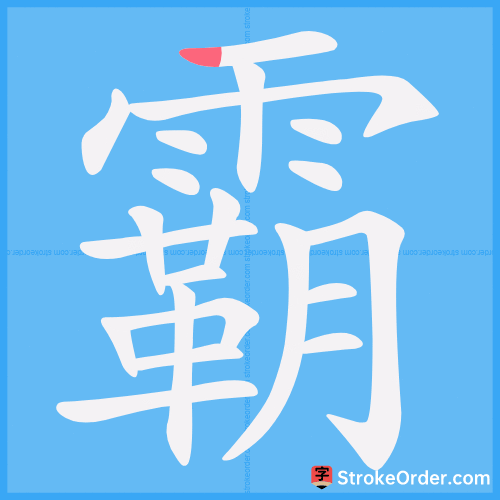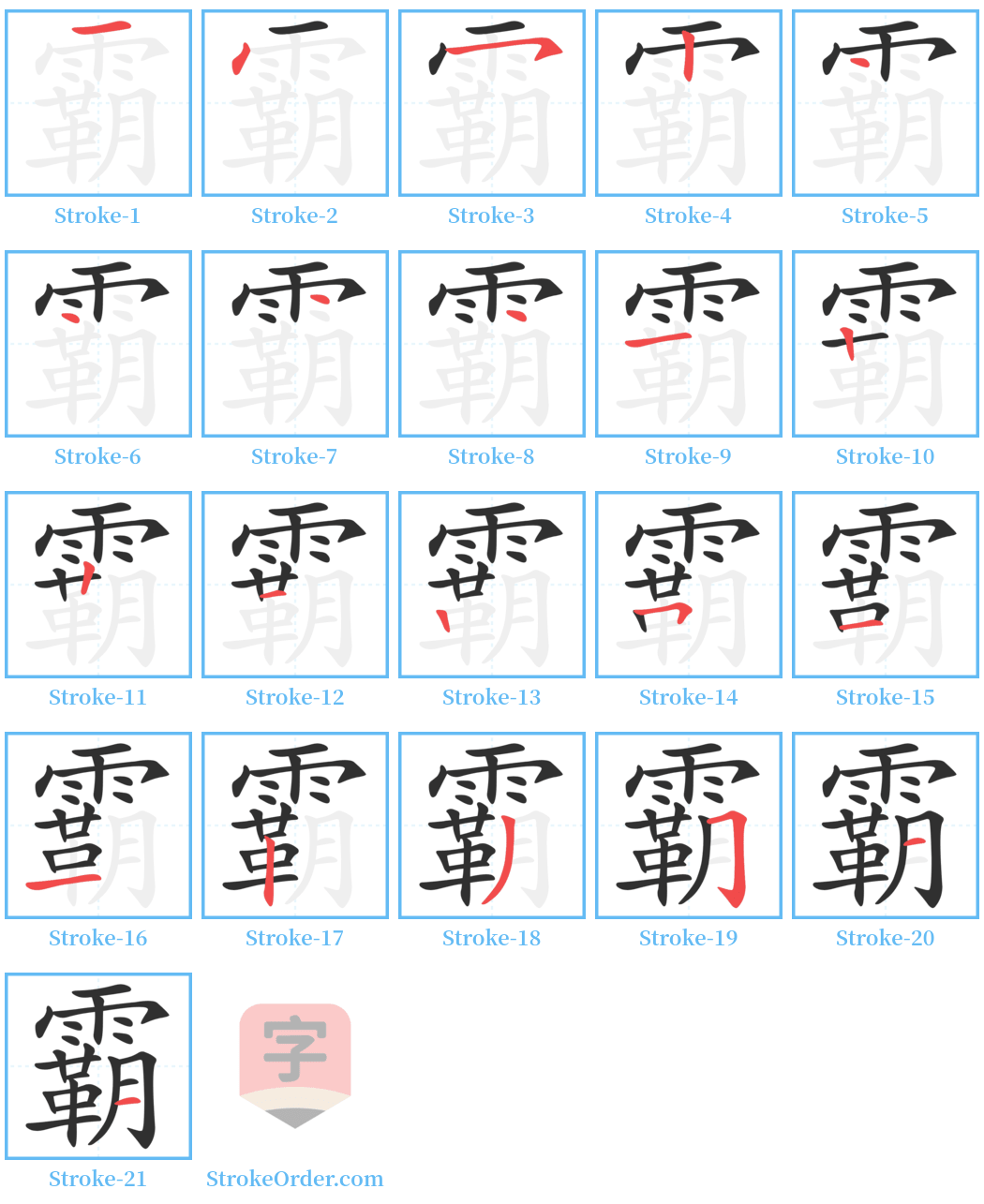霸 Stroke Order
Animated Stroke Order of 霸

Stroke Order Diagrams for 霸

Step-by-Step Handwriting Guide for 霸

Learn to Write Chinese Characters with Video Tutorials
Watch the video of writing the Chinese character "霸", learn the correct stroke order (笔顺) of the character "霸", and master the standard way of writing the character "霸".
Free Printable Handwriting Practice with Stroke Order: 霸
Printable Writing Practice Worksheet of "霸" in Portrait Orientation (Tian Zi Ge)

Printable Writing Practice Worksheet of "霸" in Landscape Orientation (Tian Zi Ge)

Information of 霸
Pinyin
bà
Radical
雨
Strokes
21 strokes
Usage
★★★★★
Definition
feudal chief / rule by force / tyrant / lord / master / hegemon / usurp
霸
[bà]
[名]
1. 指依杖权势或武力欺压他人的人或集团。
(Refers to a person or group that bullies others by relying on power or force.)
例如:~王。称~。恶~。
(For example: overlord; named tyrant; evil tyrant.)
2. 奉行强力政策,或实行强力占有。
(To follow a policy of strong power or to implement strong occupation.)
例如:~占。~权。~道。~略。
(For example: tyrannize in occupation; seize power; tyrannical rule; oppressive strategy.)
3. 古代称诸侯的盟主。
(In ancient times, refers to the leader of the feudal lords.)
例如:~主(①中国春秋时势力最大并取得首领地位的诸侯;②在某一领域或地区称霸的人或集团)。
(For example: overlord—①a feudal lord in Spring and Autumn period with the greatest power; ②a person or group that dominates in a certain field or region.)
例如:~业。春秋五~。
(For example: hegemony in a field; the Five Overlords of the Spring and Autumn period.)
[动]
1. 称霸
(To dominate or tyrannize.)
例如:《礼记·祭法》:共工氏之霸九州也。
(For example: Confucian Classics—Rituals: Gong Gong's dominance over the Nine Provinces.)
2. 霸占
(To seize by force.)
例如:《吕梁英雄传》:硬把桦林山这座天生天化的东西霸成他自己的家产。
(For example: "He forcibly seized the naturally formed Hualin Mountain as his own property.")
3. (文采、才能等) 过人
(To surpass in talent or literary skill.)
例如:《文心雕龙》:主佐合德,文采必霸。
(For example: "The chief and assistant must work harmoniously for virtue, and their literary talent will surely surpass.")
另外
1. 农历每月月初始见的月光或月亮。
(The moonlight or moon seen at the beginning of each lunar month.)
例如:《说文解字·月部》:“霸,月始生魄然也,承大月二日,承小月三日。”
(For example: "Bà means the lunar phase at the beginning, as explained in Shuo Wen Jie Zi.")
例如:《汉书·卷二一·律历志下》:“惟四月哉生霸。”
(For example: "Only in April is the phase of Bà born.")
The Conqueror Bids Farewell to His Favorite Concubine (tragic opera by Mei Lanfang 梅蘭芳|梅兰芳[Mei2 Lan2 fang1]) / Farewell My Concubine (1993 film by Chen Kaige)
a powerful chief of the princes of the Spring and Autumn Period (770-476 BC) / overlord / hegemon
the Way of the Hegemon / abbr. for 霸王之道 / despotic rule / rule by might / evil as opposed to the Way of the King 王道 / overbearing / tyranny / (of liquor, medicine etc) strong / potent
Input Method for 霸
Pinyin
ba4
Wubi
fafe
Cangjie
mbtjb
Zhengma
fveq
Four Corner
10527
Unicode
U+9738
Same Pronunciation Characters